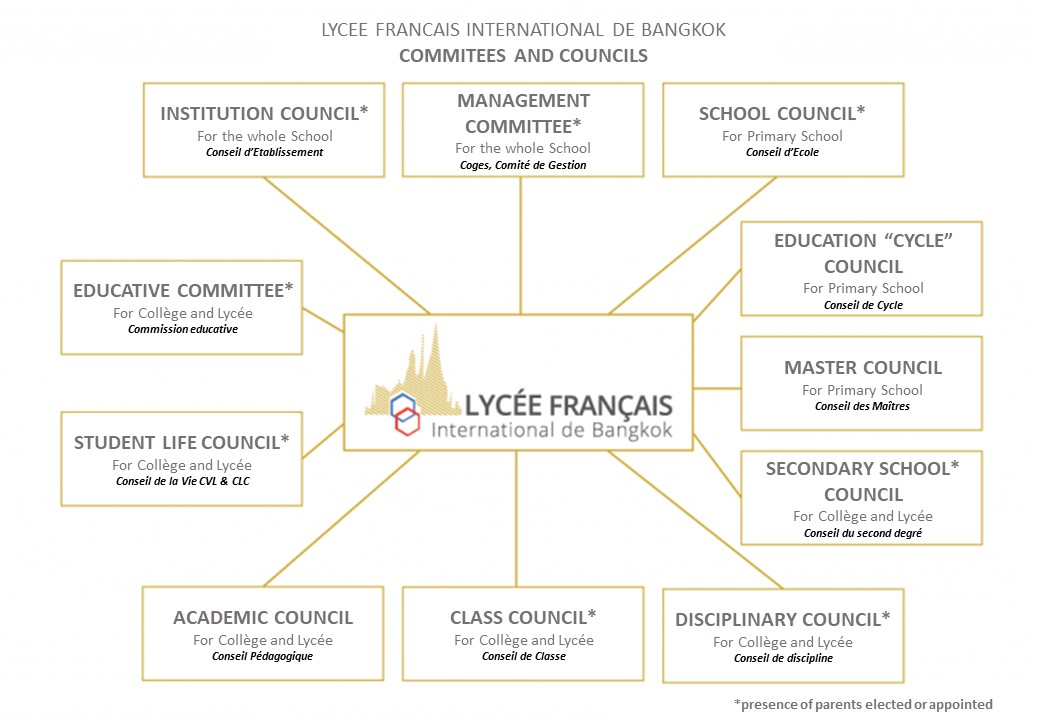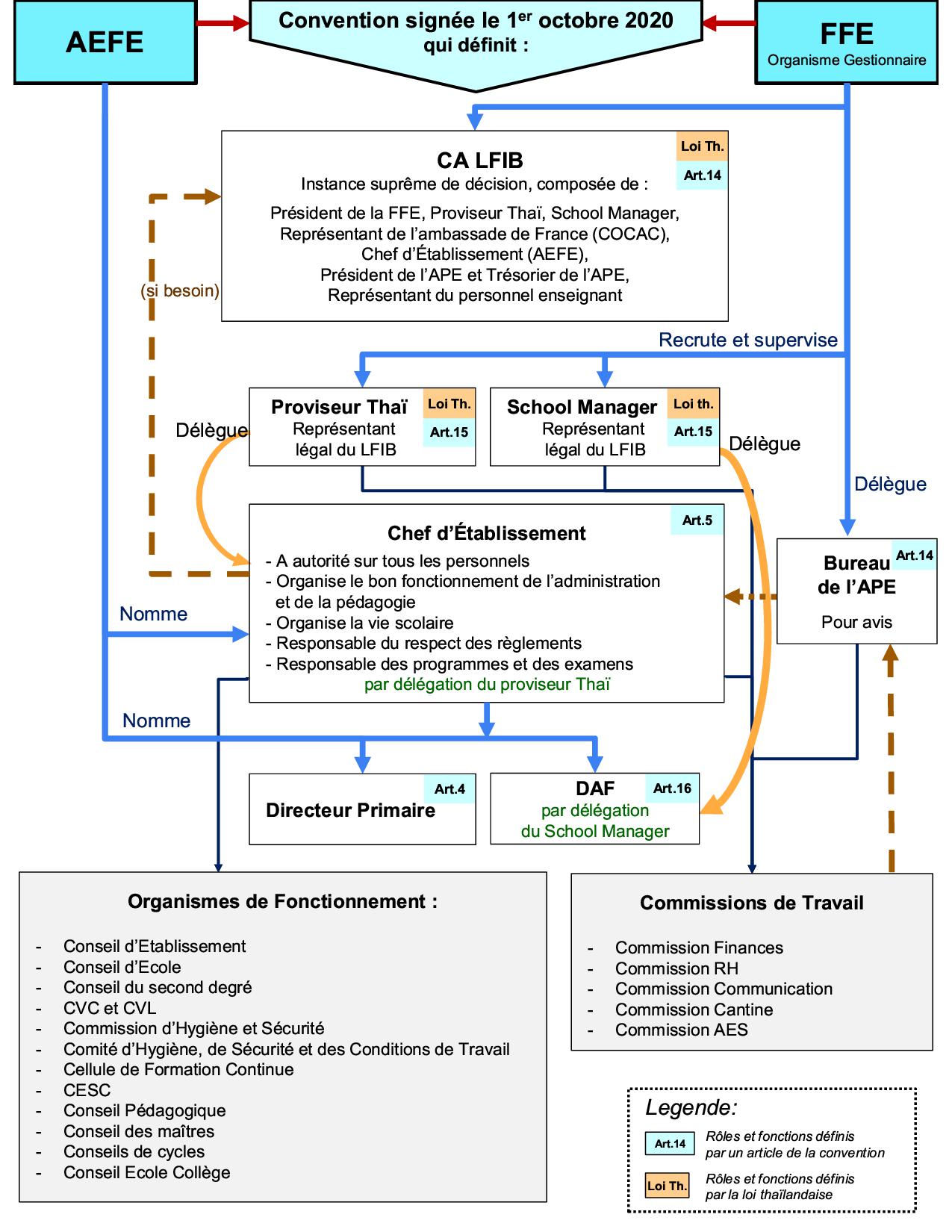Recognized as dialogue and collaboration authorities between the different players of French education in Bangkok, the instances are contributing to simplifying common projects communication between the different parties. These structures enable the meeting of players and of AEFE’s french institutions. Some of them are enabled to make decisions.
1. The “Conseil d’Etablissement” (Institution Council): main body who manages Institution’s concerns. It is qualified regarding the 1st and 2nd degrees. It is qualified to manage every academic and educative matters in the Institution.
2. The “Conseil d’Ecole” (School Council): including the 1st degree learning, and parents’ representatives, this instance is managed by the primary school headmistress. It votes the internal regulations of the school on a proposal of the headmistress, and is consulted, for advice, regarding every matter tied to academic life and operating.
3. “Conseil du second degré » (Second Degree’s Council): this structure prepares the
Studies of the “Conseil d’Etablissement” related to the 2nd degree, and votes the internal regulations for the secondary level.
4.”Conseil de la Vie Collégienne” (CVC) and “Conseil pour la Vie Lycéeenne (CVL): they are aimed at developing privileged places of exchange and listening between the pupils and the adults of the academic community. In these structures are debated all the matters concerning life conditions in the institution.
5. “Conseil de discipline” (Disciplinary Council): as of the 2nd degree, it is the headmaster’s attribution to decide whether or not to start disciplinary prosecution against one pupil. He is warned in a written way by a member of the academic community, and decides whether or not to start necessary disciplinary prosecution.
6. “Commission hygiène et sécurité de la communauté scolaire” (CHSCS): this commission is set within the Institution in compliance with local regulation. It is qualified in any matter regarding safety and hygiene, safety plans, risks prevention program, records keeping, DUERP update (Document Unique d’Evaluation des Risques Professionnels) (Unique Document for Professional Risks Evaluation).
7. “Commission Hygiene, Sécurité et Conditions de Travail du personnel” (CHSCT): The «Conseil d’Etablissement» delegates to this structure the areas related to professional risks analysis and prevention, the proposition of prevention actions about bullying at work, every action aiming at hygiene improvement, safety and work conditions. It also conducts training related to these areas in the framework of continuous training.
8. “Conseil Pédagogique” (Academic Council): it is a consultative instance of the teachers about the educative policy of the Institution. It prepares the academic part of the Institution project, which includes proposals of educational experimentations. It is consulted about: help and support to the pupils’ devices, general operations for the changes in study guidance, teaching division into skill groups, the operating methods for linguistic and cultural exchanges in partnership with European and foreign academic institutions. It makes proposals about operating methods for pupils’ individual support which are then submitted to the Executive Board by the Headmaster.
9. “Conseil des Maîtres” (Masters’ Council): this consultation structure is aimed at giving an advice about the service and about the whole problems related to the school life. It may also propose parents’ involvement to educative action and give advice about the intervention of the persons who contribute to education, in the framework of the mandatory teaching activities. It also writes down the School project under Schoolmaster’s initiative. This project will be validated by the School council.
10. “Cycles’ Masters’ Council: composed of the academic team members who practice within a cycle. The cycle council is headed by one of its members. When an elementary school includes 3 or 4 classes, the “Conseil des maîtres de cycle” gathers all the school teachers to set-up the academic cycle project, implement it, ensure its evaluation, define the tools of pupils’ follow-up inside the cycle, and regularly examine the academic condition of every pupil.
11. “Conseil d’Ecole/du Collège” (School/College Council): its aim is mainly academic, and it leads academic actions within the whole cycles together with the other local instances. The elaborated projects are related to teachings, teachers, and 1st and 2nd degrees pupils, that is to say players as well as the contents of the education system.
Not only does it limits itself to ensure the link from CM2 to 6th grade, but also is responsible for every pupil of school and college.
12. “Commission Educative” (Educative Commission): is mandatory in every institution, and is in charge of examining the condition of a pupil whose behaviour is inappropriate towards life regulations of the institution, or who does not meet his academic requirements. It has to look for a personalized educative answer -in an academic and educative view- that will lead the pupils to think about the meaning of their behaviour, It must not be mistaken with the conseil de discipline, that it does not replace in any case. It is also consulted when grave or recurrent events occur. It is part to the implementation of a clear prevention intervention and sanctioning policy, in order to fight against scholar bullying and any kind of discrimination.
Would you wish to learn more about the daily operations and the legislative organisation of the instances, please visit the eduscol website (http://eduscol.education.fr:), to have a look at the available resources.







